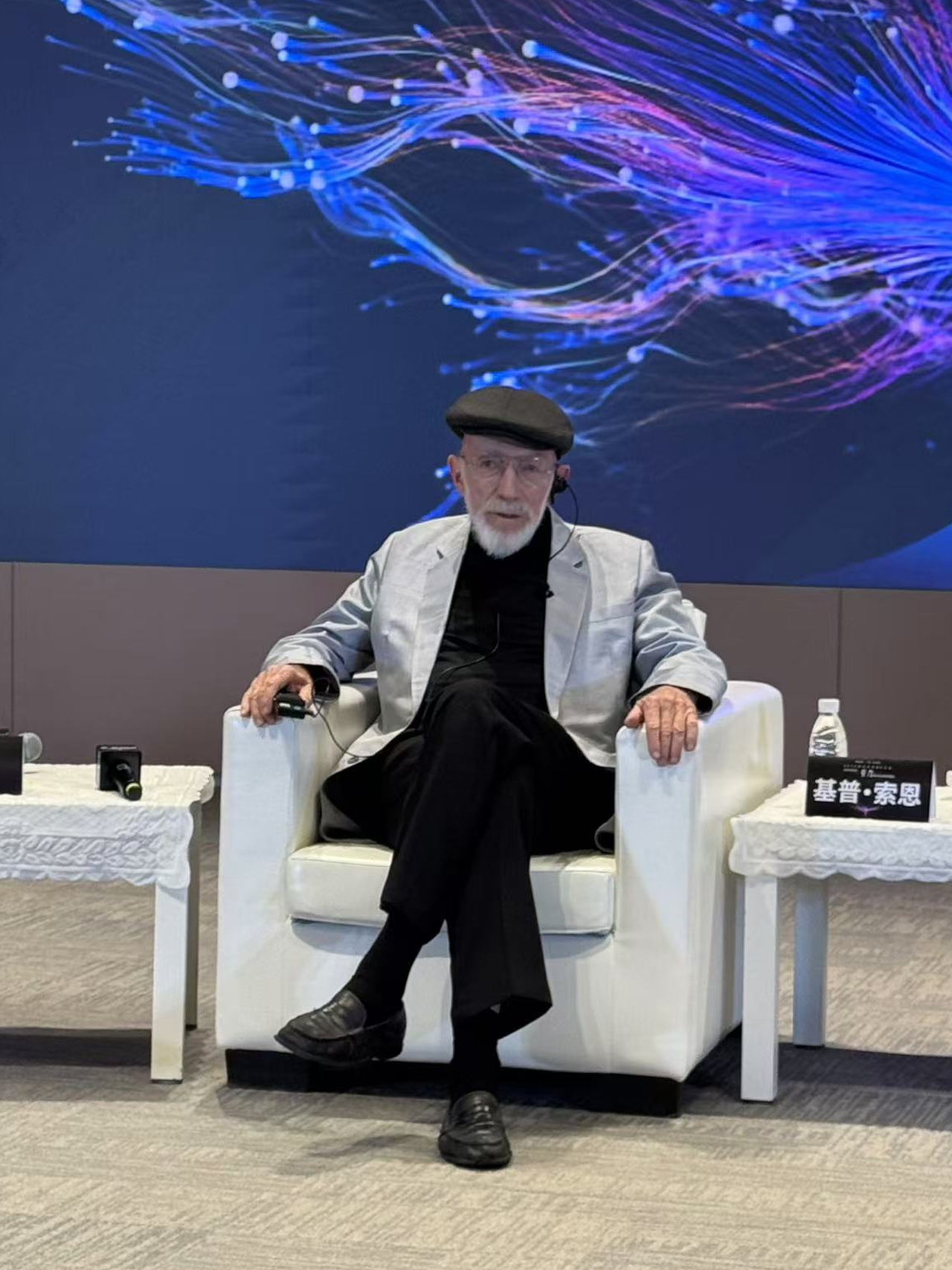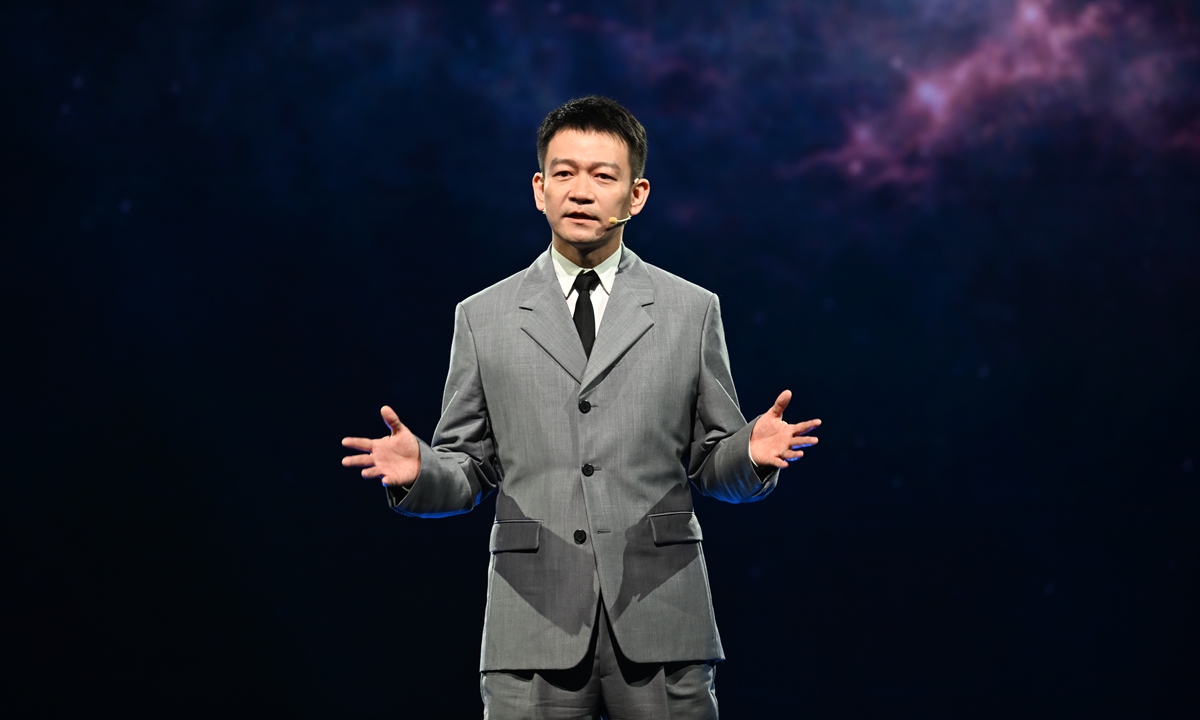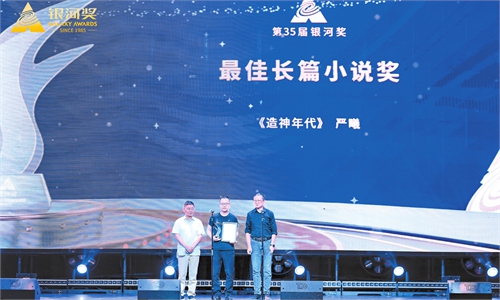ARTS / CULTURE & LEISURE
Nobel Prize in Physics winner Thorne, 'Wandering Earth' director Guo Fan mull over sci-fi collaboration

A view inside the Chengdu Science Fiction Museum, the venue for the WE Summit Photo: Courtesy of organizers
It's no question that Christopher Nolan's movie Interstellar is considered one of the greatest sci-fi movies, constantly discussed not only because of its compelling storyline and dazzling special effects, but also for sticking to established science, while any speculation remains in the realm of plausibility. Behind the masterpiece film was Kip Thorne, winner of the Nobel Prize in Physics 2017 and science advisor and executive producer of Interstellar.
At the Tencent WE Summit in Chengdu, Southwest China's Sichuan Province on Monday, Thorne engaged in a conversation with renowned Chinese director Guo Fan, best known for his sci-fi blockbuster series The Wandering Earth. Guo invited Thorne to be the science advisor for his film as they talked about sci-fi and arts.
"In 10 to 15 years, China's sci-fi movies will achieve a higher position on the global stage with efforts from a growing number of young sci-fi content creators," Guo told the Global Times on Monday at the summit.

A view inside the Chengdu Science Fiction Museum Photo: Courtesy of organizers
Wings of imagination
Gravitation has been a key element in both Interstellar and The Wandering Earth. In Interstellar, only love and gravity can travel through time and space while in The Wandering Earth, scientists imagine using Jupiter's gravitational slingshot effect to accelerate the Earth's expulsion from the solar system.
From Isaac Newton's law of universal gravitation to Albert Einstein's theory of relativity, human exploration of gravity has run through the entire history of science and has also promoted the exploration of space.
Science and arts are the greatest common denominators of mankind. It is the mutual attraction of science and arts that promotes the integration of the beauty of reason and the beauty of creation, opening up a new perspective for people to see the world.

Kip Thorne Photo: Xu Liuliu/GT
Thorne said at the summit that he began to read Chinese writer Liu Cixin's The Three-body Problem a year ago, which has since become one of his top three favorite novels. He said he was also inspired by the book One Two Three… Infinity by physicist George Gamow, and "reading it, I fell in love with theoretical physics and cosmology."
Liu was the first man from Asia to win the Hugo Award for his novel The Three-Body Problem in 2015.
Director Guo recalled that he was inspired by a sci-fi movie and was determined to pursue his career as a director to realize his sci-fi dream.
"We have very rich imaginations including moving the Earth, an idea portrayed in Chinese sci-fi writer Liu's novel. But how to realize it is very difficult," said Guo. "We need help from our scientists."
Guo recalled that when filming The Wandering Earth, they assembled a WeChat group of a number of Chinese scientists as consultants. "I still remember that we raised so many questions and proposals. No matter how late we posed our questions to the scientists, they would give timely responses even at midnight," he added.
Science and arts work so closely that many sci-fi blockbusters in the world including Interstellar, Inception, and The Wandering Earth have resulted from this collaboration.
Thorne turned much effort to a different direction beginning in 2019: Collaborations with artists, musicians, and filmmakers aimed at inspiring people, young and old, through science. Nolan's Interstellar was one brainchild of these collaborations.
"Life is too short and interesting. There are too many interesting things in the world for me to spend my entire life in. As a conventional physics professor, I did that for about 50 years," said Thorne. "For the next 15 years, I wanted to do these kinds of art projects."

Chinese director Guo Fan speaks at the WE Summit in Chengdu, Southwest China's Sichuan Province on November 3, 2024. Photo: VCG
Still in process
The Wandering Earth series, adapted from Hugo Award winner Liu's novel of the same name, has won the hearts of the world, not just for the special effects, but also for the collaboration of all humanity to save their shared future in the face of unprecedented disasters, highlighting cooperation among different nations and civilizations.
People have high expectations for the upcoming third episode of The Wandering Earth series, which is set to premiere during the 2027 Spring Festival.
"I know you are waiting for it. We are still working on it. We have upgraded the script for nine versions and we are still adding new things to it," Guo told the Global Times.
"I really wish there was a time machine I could use to travel to the future to see how The Wandering Earth 3 will be in the cinemas.
"We need to look forward. This is not only a beautiful vision for the development of Chinese sci-fi movies, but also a firm belief in the progress of human civilization as a whole."
The gravitation talk is an important part of the summit, which fosters public engagement with frontier sci-tech exploration, showcasing the visionary minds behind these developments and stimulating interest in fundamental science. The annual summit inspires numerous innovative minds to excel and explore the limitless potential for future transformation.
Nearly 100 world-renowned scientists have graced this stage to share their groundbreaking work in diverse fields, including mathematics, physics, life science, materials and energy, earth science, information technology, space technology, and intelligent manufacturing.




